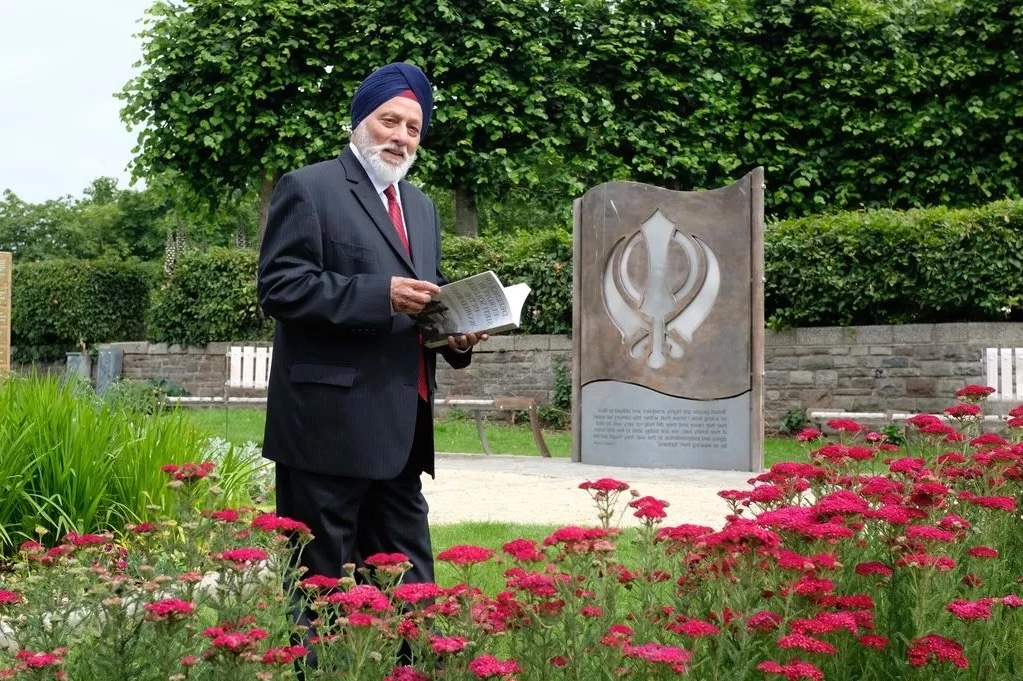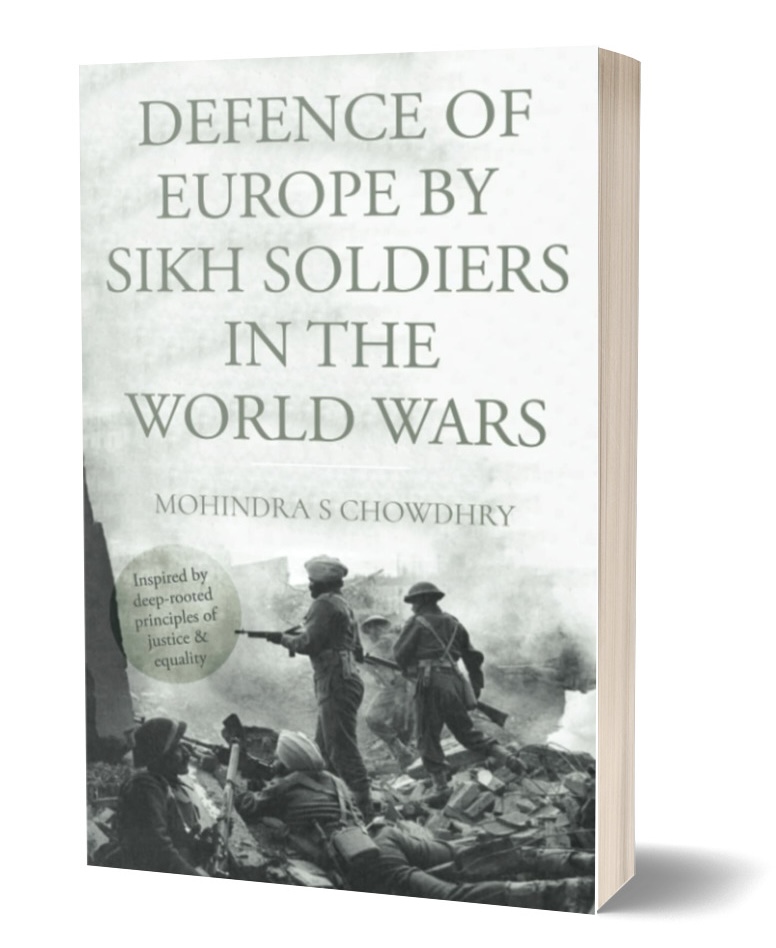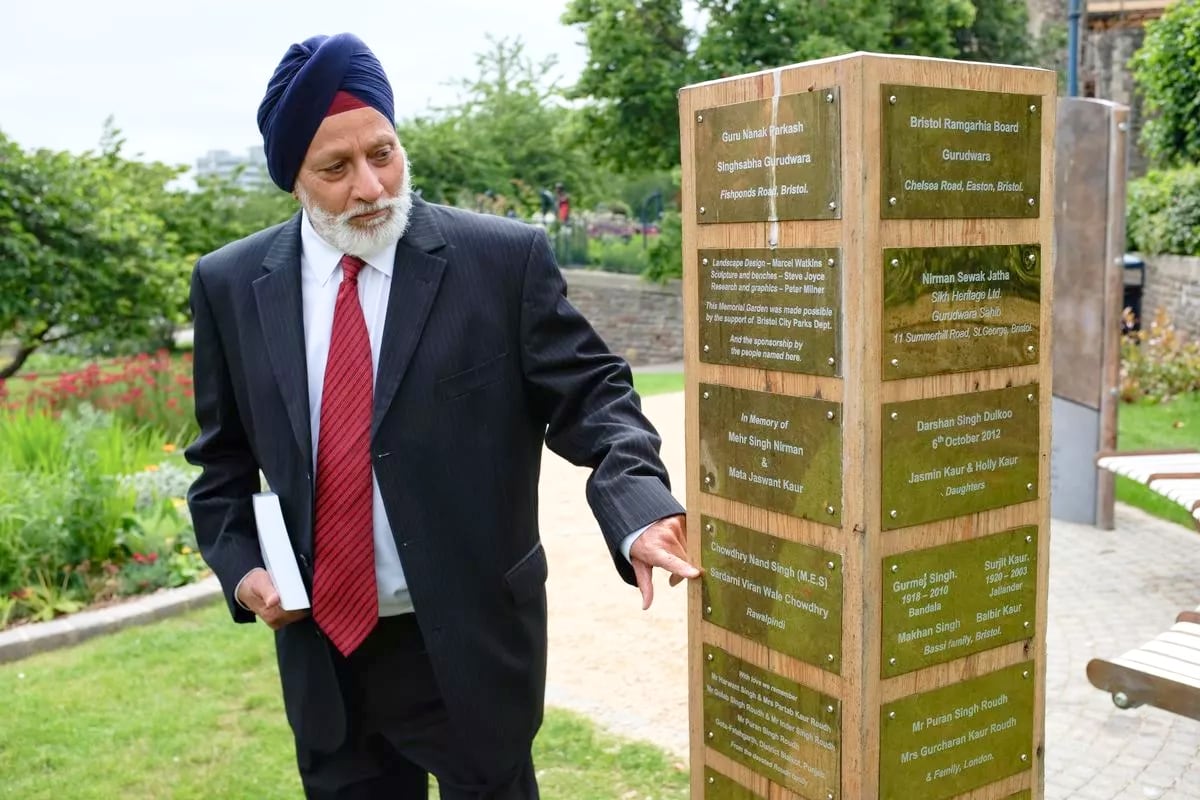Defence of Europe by Sikh Soldiers in the World Wars by Mohindra S Chowdhry
Summary and takeaways from the book.
Keywords:
Informed
Apr 7, 2025

The Author Mohindra S Chowdhry at Castle Park, Bristol, UK, outside the new Sikh War Memorial.
The author says that, "
I want everyone to understand more about the origin of the Sikh faith, our customs, where they come from, and our proud military tradition."
In the preface, the author writes "
This book is about the 'soldier saints', those soldiers of the Sikh tradition whose bravery is the stuff of legend."

ISBN: 978-1788037983
Published: March 28, 2018
Pages: 408
amazon
Mohindra S Chowdhry is a Civil Engineer who lives in Bristol, UK.
The author is "
A man whose relatives appear on a memorial plaque commemorating Bristol Sikhs' contribution to both World Wars is further honouring their memory with a book dedicated to the fallen members of the faith."
In the preface, the author writes "
This book is about the 'soldier saints', those soldiers of the Sikh tradition whose bravery is the stuff of legend."
"I think that history judges a nation by its collective character and conduct, and in these chapters I have attempted to say something about the Sikh nation.
Most of us would agree that human life is full of problems, and that life can be painful at times.
Discipline in life is a basic tool to address and problems and lead a pure and pious life, and if you have faith, to attain solve these problems.
...According to Sikhism, the remedy for pain is within you and your most reliable comfort is the service of mankind."
Sikhs as a Martial Race
"
The search for a strong Indian army and martial races started when the Russians began to stretch their wings, and the lack-lustre performance of the Indian army in 1878 – 1880 against Afghans and in Burma in 1885-1889. This led the British commander to abolish some units completely."
"
...Punjab is the breeding ground of warlike soldiers due to historical facts."
Restless Energy
The key to understanding Sikh History and Politics is 'restless energy'. If it is chanelled, Sikhs do great things. If it is not chanelled, there is petty infighting. Perhaps it is universal human trait that is more pronounced in the Sikhs.
"As soon as the threat of the English and the Marathas receded, the chiefs of Malwa started to argue among themselves on petty matters, an age old problem among people of Punjab, perhaps due to their inherent quality of restless energy.
It is often said that, whenever external threat disappeared, it was common that old feuds would explode, and resulted in loss of life and property."
Maharaja Ranjit Singh united the warring Sikh tribes (
misls) and chanelled their energy into the Second Sikh Kingdom.
"
After the death of Maharaja Ranjit Singh, his successors were not made of the same mettle nor had the same restless energy from which the ‘Sant Sepoy’ or the Saint Soldier’ was moulded. The ‘Saint’ had departed and only the soldier was left, to be manipulated, by the crafty Dogra chiefs, or the selfish Sikh chiefs whose main purpose now was to protect themselves and their land; some even wanted to secure the throne of Punjab for themselves.
To me it was not much different than what happened towards the end of the Roman Empire."
Sikhs align with whichever entity channels their 'restless energy'. That is their 'loyalty'.
In practical terms, it is a combination of purpose and meaning in life; and prosperity, development, financial rewards, and affluence that can channel their 'resless energy'.
Loyalty to British Empire
The author gives several instances of Sikh Soldiers loyalty to the British Army. He quotes from letters of Sikh Soldiers to their families.
"Now look, you my brother, our father King-Emperor of India needs us and any of us who refuses to help him in his need should be counted among the most polluted sinners. It is our first duty to show is loyal gratitude to Government’."
This loyalty was not blind loyalty. There was an implicit contract where British developed Punjab - the land of the Sikhs - and the Sikhs served with loyalty in the British Army.
The author lists elements of this implied contract.
No threat to their ownership of land and property
Religious Freedom
No preference to any religion and no discrimination on the basis of religion or 'caste'
There would be help with the irrigation, a good net work of canals was laid down and supply of water was managed very efficiently, which was a great help and even the lands which laid desolate and almost deserts, became fertile, thus yielding a lot more than expected.
Recognition and honor to brave Sikhs
Reward for Service to the British: After service of fifteen years in the army the officers were given 50 acre of land free. In addition, the other ranks were given 20 acres of fertile land. Sikhs became affluent.
Sikhs contribution in the Second World War
"
Sikh Regiment had nine Infantry Battalions and a Machine Gun Battalion in the field, plus various training and administrative units."
Naik Gian Singh of the 15th Punjab Regiment awarded Victoria Cross.
Naik Nand Singh of the 1st Sikh regiment won Victoria Cross against the Japanese in Burma.
Burma Campaign
Italy
North Africa
Battle of Malaya
"‘One should not forget the sacrifices made by the Sikhs for their fellow human beings; it adds so much to the Sikh story.
No living glory can transcend that of their supreme sacrifice in the last two world wars, when 83,005 turban wearing Sikh soldiers were killed and 109,045 were wounded.
They all died or were wounded for the freedom of Europe and the rest of the freedom loving world, and during the shell fire, they fought with no other protection but the turban, the symbol of their faith’.
(General Sir Frank Messervy, KCSI, KBE, DSO)"
Liberty and freedom
"
In those dark days of the early 1940s, if ever the British were sure about anything, it was that the word Sikh stood for those magnificent values of liberty and freedom, which are the salient features of the Sikh faith."
Why did Sikhs fight with the West against the Nazis in the Second World War even though Sikhs were ruled by the British?
Sikhs did not fight as mercenaries. "
We have stood against fundamentalist religion, caste, and stood for liberty and democracy for all of the last 500 years. In lots of forms. Which is why fighting with the British in the first World War and against the Nazis in the Second World War was inevitable for us." (
Mohindra Chowdhry, Bristol Live, 2019)
Beyond Wars
What should Sikhs do and what is their role now that there are no ongoing wars?
"
However, my idea of bravery and valour to-day is the same as it was two thousand years ago.
The only difference is the form of implementation, and how to channel those energies so that all humanity benefits.
That can happen only through education and mastering the craft to the highest level.
Sikhs are well scattered throughout the entire world and are good at whatever they are engaged in. It is very important for them to play a very important role in the main stream so that they get more recognition for their worth and also try to blend in well with the community of the individual countries they live in, yet still manage to keep their identity without any prejudices against them or the vice versa.
It is very important to be faithful to their adopted countries; those who are born there that is their motherland and not Punjab, the land of our ancestors."
"
There is no better man than a good Sikh. They are highly intelligent and make good mechanics, electricians and wireless operators."
The author further adds:
"
What it means is that with proper education and training, the majority of people can reach sufficiently high standards and good professional status, but the responsibility lies with the people who rule us.
One cannot blame the public, but the people who ruled us in the past. Due to almost eight hundred years under foreign rulers, the Indian status was not much more than slavery, living in abject poverty, but the British did provide the opportunities to the average person, and things began to change."
"
The respect, and the top political jobs including any other top position in any discipline, has to be earned with merit and honest persistent hard work."
* * *
"My religion is important to me as is yours to you; we are children of one God.
...I encourage young Sikhs to take on the baton: ignore every drawback, have trust in the strength of your honest hard work and shine through with the merit of your gifts, by participating in the main stream; I have no doubt that you will have your reward.
Remember, you are a member of the human community, every country is your motherland, to serve and protect as your own. The sky is the limit."

Mohindra S Chowdhry points to the names of his relatives who fought in the Second World War.
Related articles
From Policemen to Revolutionaries: A Sikh Diaspora in Global Shanghai, 1885–1945 by Cao Yin
Conflict: The Evolution of Warfare from 1945 to Ukraine by Gen. David Petraeus, Andrew Roberts
External Links


